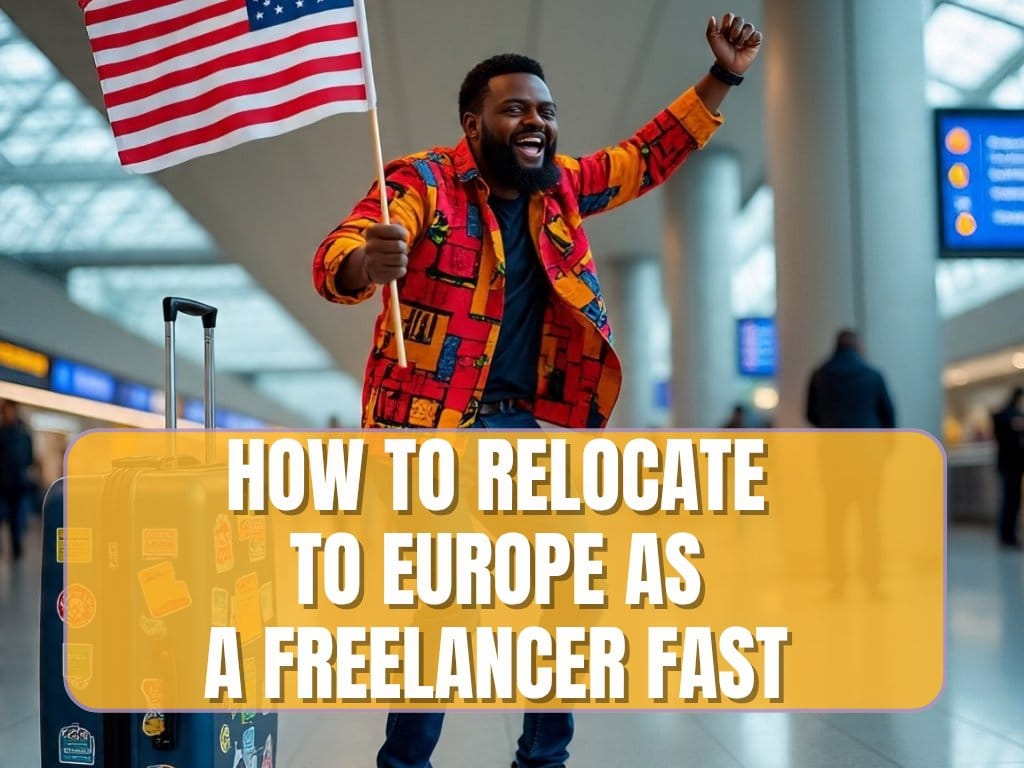
You Shocked?? ALL our articles ranks so high on Google to drive fast traffic, sales, rich clients and passive revenue for us and other businesses.. Contact Us For Yours
Moving to Europe as a freelancer sounds like a dream, right?
But for many, it feels more like chasing shadows..
Between visa stress, confusing paperwork, and not knowing where to start, the whole process can feel overwhelming.
The truth is that, most talented African, even Asian freelancers like graphic designers, copywriters, coders, and digital marketers are stuck earning peanuts despite having the skills to compete globally.
Yet every year, thousands manage to crack the code, break free from low-income markets, and start freelancing abroad legally.
Here’s a wild fact..
Germany alone welcomes over 20,000 self-employed professionals every year, many under its freelance visa route.
But as you can guess!
Very few know that digital nomad visas and freelance residence permits even exist in several European countries!
If you’re earning online and looking to relocate to Europe, now’s the best time to get serious.
At the end of this post, you’ll not only discover how to quickly relocate to Europe as a freelancer…
You’ll also get perfect answers to:
- Can I move to Germany as a freelancer?
- What is the easiest country in Europe to get a work visa?
- Which country is the No. 1 for freelancers?
- Which country hires most foreigners in Europe?
- Which country is best for unskilled workers in Europe?
Why More Freelancers Are Moving to Europe Right Now
The allure of moving to Europe as a freelancer has skyrocketed in recent years, thanks to the global shift toward remote work.
Post-COVID, companies and clients have embraced flexible work arrangements, making it easier for freelancers to work remotely from Europe without needing a traditional office job.
Europe’s vibrant cities like Berlin, Lisbon, and Barcelona have become hubs for digital nomads, offering coworking spaces, fast internet, and a welcoming vibe for remote workers.
Plus, the continent’s diverse cultures, affordable living in certain regions, and excellent quality of life make it a magnet for those seeking a better work-life balance.
The rise of EU countries with freelance visas has also played a huge role.
Countries like Portugal, Estonia, and Croatia have rolled out digital nomad visas, making it easier for non-EU citizens to legally work in Europe.
These visas cater to freelancers who can prove they work remotely for clients outside the host country, offering a legal pathway to relocate to Europe without jumping through endless bureaucratic hoops.
Add to that the affordability of certain European destinations compared to North America or Australia, and it’s no wonder freelancers are packing their bags.
But what makes moving to Europe as a freelancer so appealing beyond the scenery and culture?
Let’s explore the tangible benefits next.
Top Benefits of Relocating to Europe as a Freelancer
Relocating to Europe as a freelancer comes with a host of perks that go beyond just a change of scenery.
First, the quality of life is hard to beat. From universal healthcare in many countries to excellent public transportation, Europe offers a lifestyle that’s both convenient and enriching.
Imagine working from a coworking space in Amsterdam one week and exploring the canals the next
All while maintaining your freelance income.
Another major benefit is the diversity of opportunities.
Europe’s freelance market is booming, with industries like tech, design, and content creation in high demand.
By moving to Europe as a freelancer, you gain access to a global client base, especially if you’re in a time zone that aligns well with both North American and Asian markets.
Using reliable international payment gateways like Wise or PayPal ensures you get paid quickly and securely, no matter where your clients are based.
Freelancing abroad also allows for personal growth.
Immersing yourself in new cultures, learning a language, or even just navigating a new city sharpens your adaptability and problem-solving skills
These qualities that make you a better freelancer.
Plus, many European countries offer tax incentives for digital nomads, such as Greece’s 50% income tax reduction for remote workers.
So, which European countries are the best for freelancers looking to make the move?
Let’s break it down.
Best European Countries for Freelancers
Not all EU countries with freelance visas are created equal, and choosing the right destination is key to successfully moving to Europe as a freelancer.
Here are some top picks based on affordability, visa options, and freelancer-friendly environments:
Portugal:
Known for its D7 and D8 visas, Portugal is a freelancer’s paradise.
Lisbon and Porto are vibrant hubs with affordable living costs (average rent for a one-bedroom apartment in Lisbon is around €585) and a thriving expat community.

2 Business Ebooks to Sell More in Your Business
The D7 visa is ideal for those with passive income, while the D8 caters to digital nomads working remotely.
Estonia:
A leader in digital innovation, Estonia offers a digital nomad visa that allows freelancers to stay for up to a year.
With a minimum income requirement of €3,500 per month, it’s perfect for high-earning freelancers in tech or consulting.
Tallinn’s fast internet and low cost of living make it a top choice.
Croatia:
Croatia’s digital nomad visa is ideal for freelancers who want to enjoy stunning coastlines while working remotely from Europe.
Zagreb and Dubrovnik are popular spots, and the visa allows a one-year stay with no local income tax for remote workers.
Germany:
Berlin’s freelancer visa (Freiberufler) is perfect for creative professionals like writers, designers, and IT specialists.
You’ll need a solid business plan and client contracts, but Germany’s strong economy and vibrant freelance scene make it worth the effort.
Greece:
With its low cost of living and a digital nomad visa offering a 50% tax break, Greece is a dreamy destination for freelancers.
You’ll need a minimum monthly income of €3,500, but the Mediterranean lifestyle and stunning scenery make it a compelling choice.
Each of these countries offers unique advantages, but how do you legally stay and work there?
Let’s dive into the visa options available.
Visa Options for Freelancers Moving to Europe

Moving to Europe as a freelancer requires navigating the visa landscape, but the good news is that many EU countries with freelance visas have simplified the process for digital nomads.
Here’s a rundown of the most popular options:
Portugal’s D7 and D8 Visas:
The D7 visa is for those with passive income (at least €600/month), while the D8 is tailored for remote workers and freelancers.
Both are renewable for up to five years, with a path to permanent residency.
You’ll need proof of income, health insurance, and a clean criminal record.
Estonia’s Digital Nomad Visa:
Launched in 2020, this visa allows a one-year stay (extendable by six months) for freelancers earning at least €3,500 monthly.
It’s ideal for those who work for clients outside Estonia.
Croatia’s Digital Nomad Visa:
This visa offers a one-year stay with no local income tax for remote workers.
You’ll need to prove a monthly income of around $2,500 and secure accommodation.
Germany’s Freiberufler Visa:
Aimed at freelancers in creative or tech fields, this visa requires a business plan, client contracts (preferably with German clients), and proof of financial stability.
It’s a bit more complex but ideal for those targeting Berlin’s thriving freelance market.
Greece’s Digital Nomad Visa:
Introduced in 2021, this visa offers a 50% tax reduction and requires a minimum monthly income of €3,500.
It’s perfect for freelancers who want to work remotely from Europe while enjoying Greece’s low cost of living.
Czech Republic’s Zivno Visa:
This long-term visa requires a trade license and proof of freelance work.
It’s a great option for those planning to work with local clients in Prague or Brno, though the paperwork can be complex.
Each visa has unique requirements, so what steps should you take to make moving to Europe as a freelancer a reality?
Let’s map it out.
Step-by-Step Guide to Moving to Europe as a Freelancer
Relocating to Europe as a freelancer may seem daunting, but with a clear plan, it’s entirely achievable.
Here’s a step-by-step guide to help you make the move:
Research Your Destination:
Choose a country that aligns with your lifestyle and income.
Consider factors like cost of living, visa requirements, and freelancer-friendly infrastructure.
For example, Portugal and Croatia are affordable, while Germany offers a robust freelance market.
Check Visa Eligibility:
Review the specific visa requirements for your chosen country.
Most digital nomad visas require proof of income, health insurance, and a clean criminal record.
Websites like Visadb.io can help you identify eligible countries.
Build Your Freelance Portfolio:
Before you move to Europe with a remote job, ensure you have a steady client base.
Platforms like Upwork, Freelancer.com, and Fiverr can help you land gigs and build proof of income.
Secure Health Insurance:
Most freelance visas require private medical insurance valid for the duration of your stay.
Research providers that offer coverage in your host country.
Arrange Accommodation:
Many visas require proof of accommodation, such as a lease agreement.
Platforms like Flatio cater to digital nomads with flexible, deposit-free rentals.
Apply for the Visa:
Submit your application online or through the country’s embassy.
Be prepared for fees (typically €100-€400) and processing times of up to a month.
Set Up Finances:
Open an international bank account with services like N26 or Wise to manage payments from clients worldwide.
Using reliable international payment gateways ensures smooth transactions.
Register Your Business:
In some countries, you’ll need to register as a freelancer or sole proprietor.
For example, Spain’s “autonomo” status requires proof of freelance work.
Plan for Taxes:
Research tax obligations in your host country and home country to avoid double taxation.
Tools like expatfile or H&R Block can simplify tax filing.
What documents do you need to gather to make this process smooth?
Let’s cover the essentials next.
Essential Documents Needed to Move to Europe as a Freelancer
Moving to Europe as a freelancer requires careful preparation, especially when it comes to paperwork.
Here’s a list of essential documents you’ll likely need for most freelance visas:
- Valid Passport: Your passport must be valid for at least one year and have at least two blank pages.
- Proof of Income: Bank statements, pay stubs, or client invoices showing a minimum income (e.g., €3,500/month for Estonia or Greece).
- Private Health Insurance: A policy valid in your host country for the entire duration of your stay.
- Proof of Accommodation: A lease agreement or proof of property ownership. Platforms like Flatio can help secure rentals.
- Criminal Background Check: A certificate of no criminal record, often required to be apostilled.
- Business Plan or Client Contracts: For visas like Germany’s Freiberufler, you’ll need a business plan or letters of intent from clients (preferably local).
- Application Forms: Specific forms for the visa, often available online through the country’s immigration website.
- Passport-Sized Photos: Color photos on a light background, meeting the host country’s specifications.
- Motivation Letter: Some countries, like Malta, require a letter explaining why you want to move and work remotely from Europe.
Pro tip: Always check the specific requirements on the official government website of your chosen country, as they can vary.
For example, the Czech Republic may require documents in Czech, while Germany prefers client contracts translated into German.
Now that you’ve got your paperwork sorted, how do you find work to sustain your freelance lifestyle in Europe?
Let’s explore the best platforms.
Freelancing Platforms that Support Remote Work from Europe
Once you’ve relocated to Europe, maintaining a steady income is crucial.
Fortunately, there are plenty of freelance websites and remote work tools to help you thrive as a digital nomad.
Here are some top platforms to consider:
Upwork:
A global marketplace connecting freelancers with clients in tech, writing, design, and more.
It’s perfect for building a client base before and after moving to Europe as a freelancer.
Freelancer.com:
Another popular platform offering short- and long-term gigs.
It’s ideal for finding clients worldwide, especially if you’re working remotely from Europe.
Fiverr:
Great for freelancers who want to showcase their services and attract clients.
It’s especially useful for creative professionals like graphic designers and content creators.
Worksome:
Amazing wall arts for your space, See More..
A Europe-based platform connecting freelancers with tech and marketing projects.
It’s perfect for those targeting European clients.
Xolo:
Based in Estonia, Xolo offers business-as-a-service plans for freelancers, including invoicing and tax management, making it easier to work remotely from Europe.
Toptal:
Ideal for high-earning freelancers in tech and consulting, Toptal connects top talent with global clients, perfect for those who’ve acquired the best tech certifications.
To maximize productivity, invest in remote work tools like Toggl for time tracking, Slack for client communication, and Trello for project management.
Using reliable international payment gateways like Wise, PayPal, or Convera ensures you get paid securely and with minimal fees.
For those wondering about other destinations, such as how to legally work in Canada, the process is similar but involves different visas, like the Working Holiday Visa or the Temporary Foreign Worker Program.
Researching Canada’s requirements can be a good backup plan if Europe doesn’t work out.
Moving to Europe as a freelancer is an exciting journey that combines professional freedom with cultural exploration.
When you choose the right country, securing the proper visa, and leveraging freelance platforms, you can build a thriving career as a digital nomad.
Start planning your move today and unlock the secrets to freelancing abroad in Europe.
How to Move to Europe as a Freelancer – FAQs
Below are some popular questions and their respective answers in regards to how to move to Europe as freelancer …

Can I move to Germany as a freelancer?
Yup, you can totally move to Germany as a freelancer! Germany offers the Freiberufler visa for freelancers in fields like tech, writing, or teaching. You’ll need to show proof of clients (preferably German ones with letters of intent), enough savings to support yourself (around €11,208 for a year), and health insurance. If you’re over 45, you’ll also need a pension plan or significant assets. The visa’s good for up to 3 years, and you can apply for residency afterward.
What is the easiest country in Europe to get a work visa?
The Netherlands is often considered the easiest for freelancers, thanks to the Dutch-American Friendship Treaty (DAFT) for US citizens, which only requires a €4,500 business deposit. For non-US folks, countries like Portugal (D7 visa, needing €760/month) or Estonia (Digital Nomad Visa, €3,504/month) have straightforward requirements and less paperwork compared to Germany’s bureaucracy.
Which country is the No. 1 freelancer?
Germany stands out as the top spot for freelancers. It’s got a massive economy, a huge demand for skilled freelancers (think tech, engineering, creative fields), and a solid Freiberufler visa program. Berlin’s a hotspot for digital nomads with its affordable living and vibrant startup scene. Portugal’s also a strong contender due to its D7 and D8 visas, but Germany’s scale and opportunities make it No. 1.
Which country hires most foreigners in Europe?
Germany hires the most foreigners in Europe. With a low unemployment rate (6%) and a need for 400,000 workers annually, it’s a magnet for international talent. Big companies like Volkswagen, Siemens, and startups like Zalando actively recruit foreigners, especially in tech, automotive, and engineering. The country’s open visa policies, like the Freiberufler and Opportunity Card, make it easier for non-EU folks to join.
Which country is best for unskilled workers in Europe?
Luxembourg is a great pick for unskilled workers. It’s got a high minimum wage, a stable economy, and a demand for roles like cleaners, retail workers, and kitchen staff. Visa sponsorship for non-EU workers is common, and the multilingual environment (French, German, Luxembourgish) helps foreigners fit in. The Netherlands and Sweden also offer opportunities with straightforward visa processes for seasonal or low-skill jobs.
What’s a freelancer visa, and how’s it different from a work visa?
A freelancer visa lets you work independently in Europe without a traditional employer, perfect for digital nomads or self-employed folks. Unlike a standard work visa, which usually requires a job offer from a local company, freelancer visas (like Germany’s Freiberufler or Spain’s Autónomo) ask for proof of clients, income, or a business plan. They’re designed for flexibility but often come with more paperwork.
Do I need a lot of money to move as a freelancer?
Not always, but you need enough to prove you can support yourself. For example, Portugal’s D7 visa needs €9,120 in your bank for a year, while Germany might ask for around €11,208. Some countries, like Malta, require a higher monthly income (€2,700). Having a few grand saved up and a steady gig helps smooth things out.
Can I bring my family with me?
Totally! Many freelancer visas, like Germany’s, allow you to bring your spouse and kids if you can prove you’ve got enough cash to support them. You’ll need to show financial stability and health insurance for everyone. In countries like Sweden or the Czech Republic, family permits can be processed alongside your visa, making it easier.
Do I need to speak the local language?
It depends. For freelancing, English is often enough in tech hubs like Berlin, Amsterdam, or Lisbon, especially if you’re working remotely for international clients. But for unskilled jobs or local clients, basic language skills (like B1 German in Germany) can be a must. Luxembourg’s multilingual vibe makes it easier for non-locals to get by.
What documents do I need for a freelancer visa?
Most countries want similar stuff: proof of income or clients (like letters of intent), a business plan, health insurance, a valid passport, and proof of residence (like a rental agreement). Germany asks for an earnings preview, while the Czech Republic needs a trade license. Check the specific country’s embassy website for the exact list.
How long can I stay with a freelancer visa?
It varies. Germany’s Freiberufler visa can last up to 3 years, renewable if your business is doing well. Portugal’s D7 is good for 2 years, extendable to 5. Spain’s Autónomo starts at 1 year with two 2-year extensions. Many lead to permanent residency after 5-8 years if you meet the requirements.
Do I have to pay taxes as a freelancer?
Yup, you’ll pay taxes in the country you’re freelancing in if you stay long enough (usually over 180 days). Germany’s tax rate for freelancers is around 14-15%, but you’ll need a tax ID from the local tax office. Some countries, like Malta, exempt you from local taxes if you’re working for foreign clients. Always check the local rules.
How do I find clients as a freelancer in Europe?
You may start with freelance platforms like Upwork, Twago, or SimplyHired to connect with global clients. For local clients, network in coworking spaces or attend industry meetups in cities like Berlin or Lisbon. Having a portfolio and LinkedIn profile helps. Germany often wants proof of local clients for visa approval, so reach out to businesses early.
Moving to Europe as a Freelancer This Year – CONCLUSION
Wrapping up, if you’ve been dreaming of moving to Europe as a freelancer, there’s no better time than now to make it real.
The truth is..
Whether you’re a designer, developer, writer, marketer, or creative, there are several pathways available to start freelancing abroad legally and comfortably.
From tapping into digital nomad visas in places like Portugal and Spain, to getting residency through remote work schemes in Estonia or Germany, Europe is wide open for remote talents.
Remember, it’s not just about crossing borders
It’s about building a lifestyle where you can work remotely from Europe without constantly worrying about immigration hassles.
Learn how to present your freelance work as a legitimate income source, set up your international payments, research cost-of-living-friendly cities, and align with the visa rules of the country you’re targeting.
Do you have any questions and contributions, kindly leave them using the comments section below

👋🏽 Ani David right here!!!
If you would love us to write a promotional review about your business; write articles for your website; or even design a new and beautiful website for your business… Check out the Digital Services, we provide for businesses and companies...
IMPORTANT NOTICE: This post is not an endorsement of any platform or program mentioned. We are not affiliated with any third-party brand discussed here. Your decisions are solely your responsibility. See our full disclaimer here for important legal and content information






